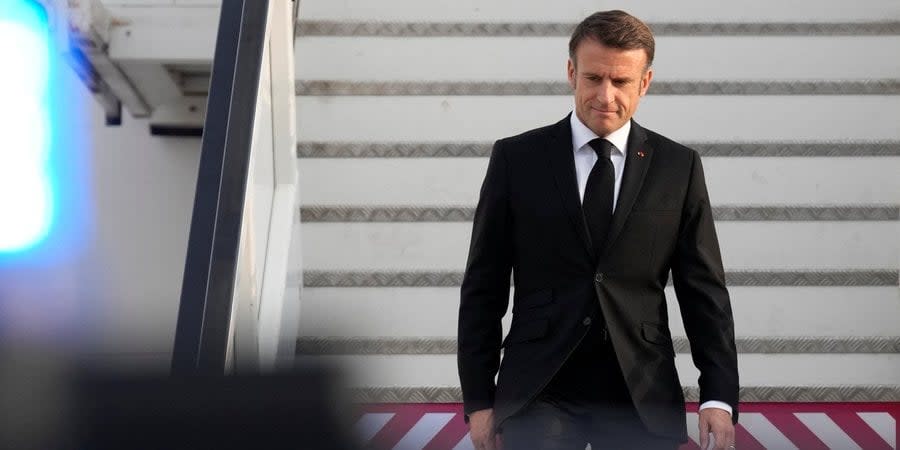NATO finally accepts possible clash with Russia, expert says

- Oops!Something went wrong.Please try again later.
If NATO decides to send military personnel to Ukraine, it would surely be limited to a small number of specialists, Ukrainian international affairs analyst Ivan Yakovina said in an interview with NV Radio on Feb. 27.
Read also: Netherlands doesn’t rule out Western troops in Ukraine, ‘All options open’ — Dutch Defense Ministry
He was commenting on French President Emmanuel Macron’s statement about possible deployment of Western troops to Ukraine, which NATO Secretary General Jens Stoltenberg has already denied, saying there are no such plans.
Basically, Macron didn’t rule out sending NATO troops to war against Russia in Ukraine.
“There’s no consensus today to send troops on the ground in an official, endorsed manner, but in terms of dynamics, nothing can be ruled out,” the French president said.
“I was particularly interested in this phrase ‘in an official, endorsed manner,” Yakovina notes.
“Does it mean that sending troops to Ukraine is generally considered and there is a consensus in an unofficial, unendorsed manner? Is that how we should understand it?”
Read also: US will not deploy troops in Ukraine – White House
“Most likely, he didn’t mean it that way. Most likely, he meant that they were considering two options for sending troops, both as official units so that everyone would know about it, and also as unofficial ones, as military advisers, or perhaps without announcing anything, just that some troops would be sent.”
Read also: In a first from Ukraine’s NATO allies, France raises prospect of Western troop deployment to Ukraine
“Why is NATO starting to think about it now? First, because everyone knows the situation with the U.S. military aid, which is being delayed. Second, Macron said that almost all EU countries realize that Russia is considering plans to invade EU territory. This idea isn’t marginal, it’s already generally accepted. That is, almost all EU countries are preparing for the fact that war with Russia will take place sooner or later. Therefore, they would definitely like to prevent this turn of events and end this war in non-EU territory,” the expert said.
Read also: Czech, Polish PMs rule out sending their own ground forces to back Ukraine, despite recent talks
According to Yakovina, Macron wants to show that the determination of NATO countries to help Ukraine has not gone anywhere and that the allies will make effort to end this war so that it never reaches their territory.
“I think this news isn’t bad, because [Russian dictator Vladimir Putin’s] press secretary Dmitry Peskov immediately reacted to Macron’s statement,” the expert said.
Read also: NATO troops in Ukraine won’t be used to fight Russia – France
“He said the appearance of any NATO troops on the territory of Ukraine would mean the beginning of a war between NATO and Russia, as if ‘it will inevitably lead to a military clash.”
“I think NATO has already more or less come to terms with the fact that such a clash will take place since Russia doesn’t hide its aggressive plans. Therefore, they decided that it would be better not to have it on their territory. That is, they are generally ready for something like that.”
Read also: NATO ‘not planning’ to send troops, though European allies might — Stoltenberg
“You see, they’re already launching test balloons, probing both public opinion and the reaction of Russia and the United States to such statements. It seems to me there are grounds for Macron’s comments that Europe won’t allow Putin to win this war under any circumstances. These aren’t empty words. In fact, aid will increase in many different [forms], perhaps eventually in the form of military units,” Yakovina said.
Read also: NATO must consider "new actions" in Ukraine "without crossing threshold of belligerence"
“I think that if Europe is going to send some units or troops to Ukraine, most likely, it won’t be infantrymen or soldiers on tanks, or tankers, but some specialists like pilots, maybe engineers and technicians who maintain aircraft,” he said.
“That is, high-end professionals who are very long, difficult and expensive to train, who Ukraine may simply not have at the moment due to the fact that the [military] standards were Soviet…, completely different [than those] in NATO.”
“Let’s see. Anyway, this is a very interesting statement. And Russia’s worried, I would say, even frightened reaction shows that Moscow is paying a close heed to it and is very afraid of such a development,” Yakovina concludes.
We’re bringing the voice of Ukraine to the world. Support us with a one-time donation, or become a Patron!
Read the original article on The New Voice of Ukraine
